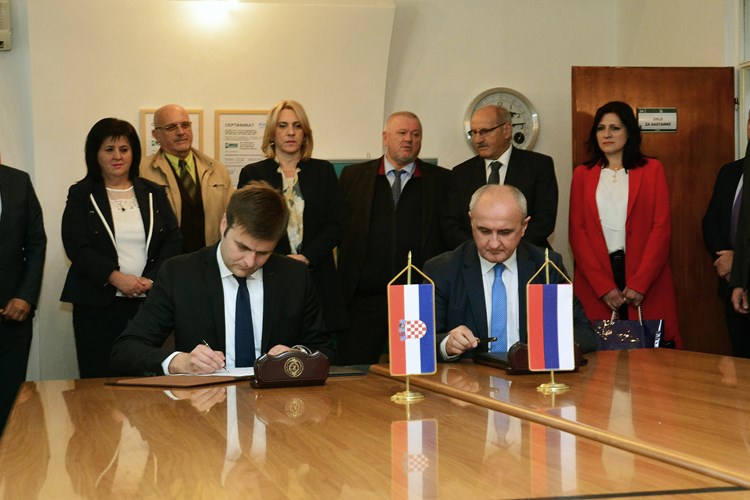- Published: 31.10.2017.
Croatia, Bosnian Serb entity sign protocol on conversion of oil refinery to one powered by gas
Croatia and the Bosnian Serb entity of Republika Srpska (RS) on Tuesday signed a protocol to convert the oil refinery at Bosanski Brod to one powered by natural gas.
The protocol was signed by Croatian Environment and Energy Minister Tomislav Coric and the RS Minister of Industries, Energy and Mining, Petar Djokic. Attending the signing ceremony was also RS Prime Minister Zeljka Cvijanovic.
The protocol was signed with the aim of dealing with the problem of cross-border air pollution affecting Slavonski Brod, a Croatian town on the other bank of the Sava River.
Air quality measurements so far have shown that the high concentrations of hydrogen sulfide in Slavonski Brod are mostly due to the Brod Oil Refinery in Bosanski Brod and that it also has a significant impact in terms of other air pollutants.
The protocol will enable connecting the refinery to the Croatian gas supply system as a direct user.
"From Croatia's perspective, this creates a possibility to finally deal with the issue of air quality in Slavonski Brod. The two governments have opened the door to cooperation between two private companies. This is a win-win situation for both sides," said Coric.
"The Crodux company will be in charge of the project from the Croatian side, and from our side the project will be headed by the Brod Oil Refinery. This investment totals around three million euros. It is important for this region and bears evidence of the two governments' commitment to cooperation, which is very much needed regionally," said Djokic.
Crodux, the company to supply gas to the oil refinery in the Serb entity, was chosen by the refinery, said Coric.
RS Prime Minister Cvijanovic said that the protocol and the project to convert the oil refinery to one powered by natural gas had also political significance as it promoted cross-border cooperation and showed the Serb entity's desire to get closer to the EU.
Cvijanovic also commented on the issue of jurisdiction over the signing of the cross-border protocol.
"Republika Srpska is in charge of energy and infrastructure and has the right to sign certain agreements. This is not a classic international agreement referring to a trunk pipeline. We are speaking about a project that will help bring gas from one country to another for a known user, with environmental and economic benefits," said Cvijanovic, adding that the protocol was not directed against anyone in Bosnia and Herzegovina but served as an example of how things should be done in the entire region.
Djokic said that the gas pipeline would run to the refinery along the route of the existing pipeline, with a connection to the trunk pipeline at Slobodnica, west of Slavonski Brod.
Text and photo: Hina
